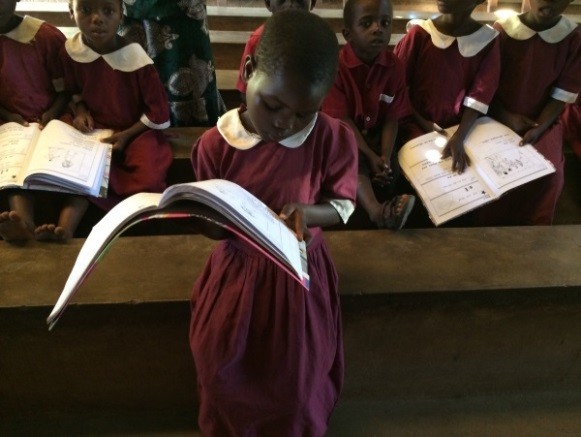
June 2014—Like many girls in Malawi, 7-year-old Stella Chibonga did not feel safe at school. She hadn't yet mastered the basics of reading, writing and arithmetic, and she performed far below grade level. She had trouble keeping up with the curriculum. Her first grade teacher, Melia Swaleyi, said that other children laughed at her because, when she tried to write, she “held her pencil with five fingers as if she was holding a fresh tilapia fish from the Shire River. She could hardly recognize the letters she was trying to write.”
Instead of being inspired in the classroom, Stella floundered, often finding reasons to stay at home. Unfortunately and inevitably, the more often she stayed home, the further behind she fell.
Finally, on one of the rare occasions that Stella did go to school, her teacher asked her to stay after class with some of her fellow students who needed extra help in reading. Using the techniques she had learned through the USAID/Malawi Early Grade Reading Activity (EGRA), Swaleyi started to teach Stella letter sounds. In that single afternoon, Stella’s experience of school changed from one of bewilderment to one of possibility.
Stella came to school the next day and the day after, staying after class to continue learning the building blocks of reading as prescribed through the teacher training and scripted lesson plans that Swaleyi received through the EGRA. Stella learned how to hold a pencil and how to sound out words. Today, Stella’s absenteeism is a thing of the past and she has begun to decode words and comprehend what she is reading. After 12 weeks, she even became a reading group leader in her class.
Swaleyi is grateful to USAID and the EGRA in helping her learn effective methodologies for teaching her students how to read. “Before the EGRA, our Standard 1 [first grade] students were not reading, even at the end of the year,” she says. “Now there are many students in my class who are reading just like Stella—and we are barely halfway through the school year.”
Stella’s initial dilemma is not an isolated case. In Malawi’s education system, girls are less likely to access or remain in school. And although boys and girls begin school at the same skill level, by the end of primary school, boys achieve 10-points higher on average than girls on the Primary School Leaving Certificate exam, which suggests that girls gradually underachieve in the upper grades.
Ignoring gender inequality has serious consequences: Girls’ education is linked to having fewer children and therefore slower population growth. Education also empowers communities to combat gender-based violence and other forms of discrimination against women and girls. Programs like the EGRA can help to stem this inequality by keeping girls like Stella in school.
The USAID/Malawi Early Grade Reading Activity is a three-year, $24 million program implemented by RTI International in August 2013. It promotes quality early grade reading instruction, the production of high-quality reading and learning materials in Chichewa and English, improved policy for reading at the national and local levels, and building a community of reading within and outside the school setting. An evaluation is currently under way to measure the impact of this intervention and how household factors and other USAID/Malawi activities affect reading scores in participating schools.
Links
Follow on Facebook







Comment
Make a general inquiry or suggest an improvement.